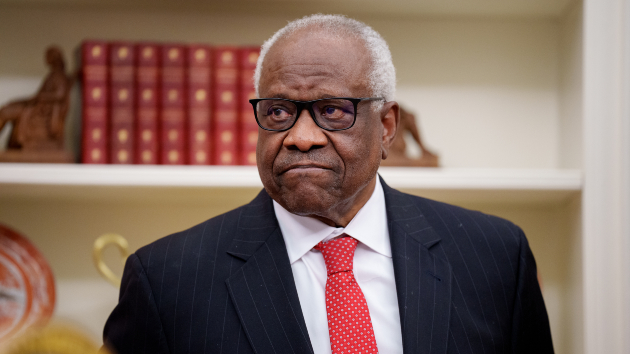
(WASHINGTON) — Justice Clarence Thomas said the Supreme Court should take a more critical approach to settled precedent, saying decided cases are not “the gospel” and suggesting some may have been based on “something somebody dreamt up and others went along with.”
Thomas made the comments during a rare public appearance Thursday evening at Catholic University’s Columbus School of Law in Washington, D.C., just over a week before the high court starts a new term that includes challenges to several major, longstanding decisions.
The Court is poised to revisit Humphrey’s Executor v U.S. — a 90-year precedent that limits a president’s ability to remove members of some independent federal agencies without cause. The justices will also consider whether to overturn Thornburg v Gingles, a landmark 1986 decision governing the use of race in redistricting under the Voting Rights Act.
For the first time, the Court is also considering a petition for writ of certiorari asking them to explicitly revisit and overturn the 2015 decision in Obergefell v Hodges, which extended marriage rights to same-sex couples.
“At some point we need to think about what we’re doing with stare decisis,” Thomas said Thursday, referring to the legal principle of abiding by previous decisions. “And it’s not some sort of talismanic deal where you can just say ‘stare decisis’ and not think, turn off the brain, right?”
The Court’s senior conservative suggested that some members of the Court over the years have blindly followed prior judgments, comparing them to passengers on a train.
“We never go to the front see who’s driving the train, where is it going. And you could go up there in the engine room, find it’s an orangutan driving the train, but you want to follow that just because it’s a train,” Thomas said.
“I don’t think that I have the gospel,” he said, “that any of these cases that have been decided are the gospel, and I do give perspective to the precedent. But it should — the precedent should be respectful of our legal tradition, and our country, and our laws, and be based on something, not just something somebody dreamt up and others went along with.”
Thomas has long been an outspoken advocate for revisiting some of the Court’s significant landmark opinions. In a 2022 concurring opinion in Dobbs v Jackson Women’s Health — which overturned Roe v Wade — Thomas urged his colleagues to “reconsider all of this Court’s substantive due process precedents, including Griswold, Lawrence, and Obergefell” — cases involving rights to contraception, same-sex intimacy, and marriage.
Copyright © 2025, ABC Audio. All rights reserved.



